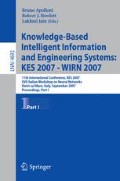Abstract
In this paper, we develop a large ontology, which is an explicit formal specification of concepts and semantic relations among them in philosophy. Our philosophy ontology is a formal specification of philosophical knowledge including knowledge of contents of classical texts of philosophy. The philosophy ontology includes contents knowledge of 72 texts of philosophy but will be expanded to almost all the texts of oriental and western philosophy which are considered as essential philosophy texts by experts. It organizes a text-based knowledge base, which includes electronic texts and philosophy articles. The philosophy ontology provides not only easy concepts to novices and students but also more specialized detailed concepts from the contents of texts to domain experts.
Access this chapter
Tax calculation will be finalised at checkout
Purchases are for personal use only
Preview
Unable to display preview. Download preview PDF.
References
Mizoguchi, R.: Tutorial on ontological engineering-Part2: Ontology development, tools and languages, New Generation Computing. OhmSha&Springer 22(1), 61–96 (2004)
Moore, G.: Topic Map technology - the state of the art. XML 2000 Conference & Exposition, Washington, USA (December 2000)
Noy, N.F., McGuinness, D.L.: Ontology Development 101: A Guide to Creating Your First Ontology, SMI technical report SMI-2001-0880 (2001)
Online Papers in Philosophy, http://opp.weatherson.net/
Pepper, S., Moore, G.: XML Topic Maps(XTM) 1.0, TopicMaps.Org. (2001), http://www.topicmaps.org/xtm/
Perseus Classics Collection, http://www.perseus.tufts.edu/cache/perscoll_Greco-Roman.html
Philosophy in Cyberspace, http://www-personal.monash.edu.au/~dey/phil/
Stanford Encyclopedia of Philosophy, http://plato.stanford.edu/
Author information
Authors and Affiliations
Editor information
Rights and permissions
Copyright information
© 2007 Springer-Verlag Berlin Heidelberg
About this paper
Cite this paper
Kim, J., Chung, H. (2007). Philosophy Ontology for Learning the Contents of Texts. In: Apolloni, B., Howlett, R.J., Jain, L. (eds) Knowledge-Based Intelligent Information and Engineering Systems. KES 2007. Lecture Notes in Computer Science(), vol 4692. Springer, Berlin, Heidelberg. https://doi.org/10.1007/978-3-540-74819-9_69
Download citation
DOI: https://doi.org/10.1007/978-3-540-74819-9_69
Publisher Name: Springer, Berlin, Heidelberg
Print ISBN: 978-3-540-74817-5
Online ISBN: 978-3-540-74819-9
eBook Packages: Computer ScienceComputer Science (R0)

